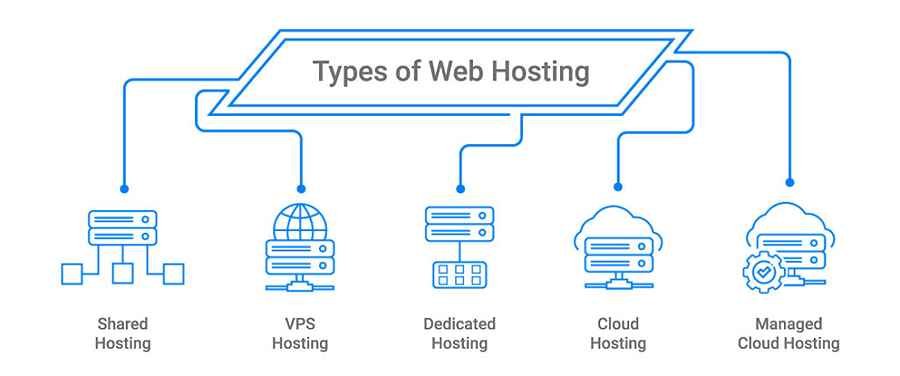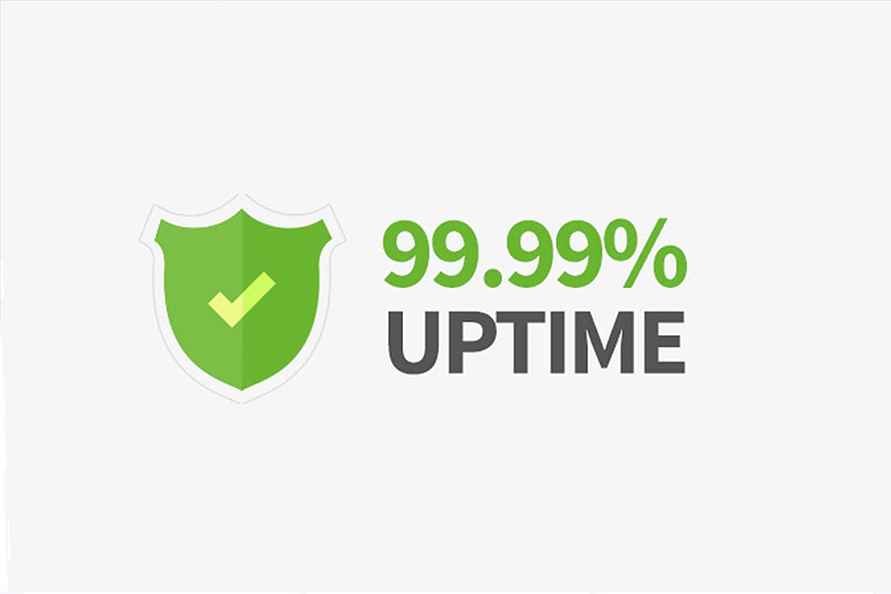You will need a domain name and website hosting to build your website.
Choosing the finest hosting for your website will save you a lot of hassles in the future because your choice will determine how much you spend each year, the success of your business, and the resources available to scale.
There are various web hosting providers that cater to various types of organizations.
Some web hosting providers will design your entire website for you, while others will only provide you with web space on which to build your website.
Your ability to manage a profitable website will be severely hampered if you do not use the best web hosting.
Here are a few things to think about while deciding where to host your website.
1. Your proposed type of website

When selecting a hosting company, keep your use case and the type of website you want to develop in mind, as the type will determine the website hosting demands you need.
A basic blog undoubtedly necessitates fewer resources than a complex website with interactive and multiple user features.
Some providers provide custom-designed plans for specific website kinds, these are hosting plans that are tailored to the demands of the custom website and are typically less expensive.
Many typical website hosting providers, for example, provide custom WordPress hosting.
This ensures that the resources provided in your hosting plan are appropriate for your website’s demands and that you are not overpaying for services that you do not need.
2. Type of web hosting

The type of web hosting you choose is essential to the success of your website.
There are numerous types of website hosting, each with capabilities tailored to specific website requirements.
Shared hosting is typically best suited for new websites because it is less expensive and has fewer complications.
Larger websites prefer dedicated hosting since they have access to the entire server and may scale their websites as needed.
A Virtual Private Server (VPS) is another option for these more complex websites, as it allows for more customization than shared hosting.
Finally, cloud hosting includes everything required for all websites, although it is somewhat expensive.
Consider your website’s requirements before deciding so as not to choose and pay for services and features you do not need.
3. Pricing per value offered
It is not a good idea to choose a web hosting company simply on the basis of price, but you should still take it into account.
You do not have to break the bank to get good hosting for your website as there is a variety of inexpensive providers with great solutions tailored to your specific website needs.
Although you do not want to overspend for hosting, you also do not want to pay too little.
Companies employ a subscription model to charge customers, so website hosting is not a one-time expense.
Many new websites will be fine with the cheapest plan, but others may benefit more from expensive plans in terms of additional features and bandwidth.
The first purchases of hosting are usually cheaper promotional offers that expire at renewals, after which you would have to start paying regular prices, which might be pricey.
Furthermore, three-year hosting plans can be attractively low in price, but if you are unsatisfied with the host, you may have to buy something else sooner.
It is safer to sign up for a year and give some room for growth.
Consider a web hosting company that offers scalable plans because switching among them can be difficult.
4. About 99% uptime

The purpose of website hosting is to keep your website online and accessible at all times!
When your website is unavailable online, you lose money, visitors, leads, emails, and so on.
It is really disappointing for your users if they are unable to access your website every time they attempt to visit.
Uptime is the time period a web hosting provider promises that your website will be available online.
The most important aspect of a decent web host is uptime; you want one with a decent uptime of at least 99%.
This implies that your website is constantly accessible and almost never unavailable.
While most hosts claim at least 99% uptime, that is not much of a guarantee.
Every web hosting provider will eventually have to conduct maintenance procedures on their servers, which will momentarily take your website offline.
A big component in determining the quality of a website hosting service is how well it manages the types of difficulties that can take your website offline.
Quality companies like HostGator and Bluehost provide a 99% uptime guarantee.
5. Website load time or speed
The load time of your website is also critical.
Everything on your site is affected by site speed; ranking high in search results, conversions on your website, satisfied customers, etc.
When looking at several web hosts, make sure you pick one that can serve every page quickly.
There is some variation in site speed, as the larger your company grows, the faster you will want your website to load.
If you intend to build a high-traffic site, you will need a host that can keep a massive website running at incredible speeds.
6. Bandwidth and disk space
You will require sufficient bandwidth and storage space if your website has numerous pages, a lot of images, and a lot of visitors.
There are unlimited bandwidth plans available, which implies that the hosting company will not monitor or cap the quantity of data transferred, thus there will be no extra bandwidth usage fees as your website’s traffic develops.
These plans sound fantastic, but what truly counts is that you have enough for your site, which may be considerably less than you anticipate.
The entire website file for most WordPress blogs is only about 1GB in size.
In this situation, paying for ‘unlimited’ capacity will provide no benefits.
If you intend to build a large site, do not cut corners, look for a host that can readily scale to millions of monthly visitors.
However, If you expect fewer than 50,000 visits per month, go with a regular shared hosting service.
7. 24/7 customer service
You will periodically need support, regardless of how much experience you have in website maintenance.
Websites frequently experience issues such as coding errors, incompatible plugins, broken updates, software-server compatibility issues, etc.
When your website has a problem, you want it addressed as soon as possible.
This is why you want to ensure that customer support is readily available, knowledgeable, and easy to work with.
Make sure your hosting company provides service around the clock without making you wait, especially on weekends, as you need to be able to work on your website on your own schedule.
A host should provide live chat support 24 hours a day, seven days a week, as well as phone, ticket, and email support.
While online reviews may not be reliable, the only true measure of a hosting provider’s customer service is the free trial period.
Almost all web hosts offer a free trial on their hosting plans, so you may set up your website and see what you think of the service before committing.
During the free trial time, you can explore your host’s customer service across all channels.
SiteGround is currently known to have the best website support of all hosting providers.
8. Intuitive management interface
Hosting companies are expected to offer website management systems to configure your hosting account features such as managing backups and SSLs, domain name, renewing hosting subscriptions, setting up subdomains and subdirectories, and so on.
You do not want to waste time figuring out how to approach these important managerial tasks.
This is where a web hosting service with a user-friendly interface comes in helpful.
Many providers exclusively use cPanel to power their platform; cPanel is excellent, with this control panel, users can manage their hosting with no technical skills required.
Some providers, like SiteGround (which is also user-friendly), have developed in-house systems, while others, such as Bluehost, combine cPanel with an in-house application for hosting account management.
9. Domain name management

A domain name is one of the essential aspects that all websites require.
Finding and registering a domain name is important because the domain is your website’s internet address.
It is also important to keep your domain name registration current for as long as you intend to use it.
Many web hosting companies allow you to manage domain registration and renewals through the same interface you use to manage your web hosting.
It is possible to register your domain with a service other than the web hosting provider you choose; however, keeping everything in one place makes it easier to manage your subscriptions.
Many hosting services give one free domain name registration for the first year.
If you do not already have one, this can be a trap because renewal after the first year can be highly expensive compared to prices from other domain registrars.
If you require a domain name, compare renewal fees to determine the true long-term cost.
10. Website backups
The problem with code is that a mistake on one line can break the entire website; these occur frequently when performing tasks like updating the software on your website or adding a new feature, etc.
This is where website backups come in handy.
If your site breaks and you do not think you can fix it, you can always restore from your backups, keeping all of your contents safe.
Many hosting providers provide a series of website backups, which may be restored with a simple request.
Choose a website hosting provider that provides routine free website backup services, and pay attention to frequency: weekly backups may be adequate for sites that never change, but daily backups are far superior.
You can also back up your website without engaging your hosting provider.
Websites can break for a variety of reasons, backups are an absolute must if you want to keep downtime to a minimum.
11. Migration – importing your site files
The ideal scenario is to select the most appropriate web hosting platform for your website’s needs from the start, but this is not always achievable.
If you are looking for new web hosting, you should look for a company that can help you with the process of transferring your website to the new hosting provider.
You should study the migration process to see if it is free or if you must pay.
Or are you only able to transfer one site for free?
Speak with a customer service representative at the prospective new hosting company to ensure you understand what you are getting into.
If the migration is simple, you will be able to move over quickly, saving you weeks of time while remaining stress-free.
Even a basic WordPress blog can be a real hassle to migrate.
Look for a simple migration feature if you are changing hosts and performing the migration yourself.
Some hosts will provide a one-click WordPress migration.
This is an important factor to consider when selecting your website hosting.
12. Website Security

Security is another key factor to consider when choosing a web hosting provider, as doing so without first learning about its security features is a big mistake.
Is the PHP on the hosting server regularly updated?
Is there a content delivery network (CDN) available?
Is your website frequently backed up, and if something goes wrong, can you recover it in a matter of minutes?
User authentication, daily backups, and firewalls are some of the features that should be included in good website hosting.
Also, does the hosting company supply a free SSL certificate?
To enable safe encrypted connections with visitors, your website needs an SSL certificate.
This function encrypts the connection between your website and the browsers of your users, preventing hackers from gaining access to it.
Today, SSL certificates are required for websites on Google Chrome, as without them, the browser informs your visitors that your site is unsafe, directing some of them to your competitors.
Most plans include free SSL but beware of those that only include it for the first year and then charge you after that.
13. Domain Emails
Domain emails (for example, contact@renixconsulting.com) show your consumers that you are serious about running your business.
It demonstrates sincerity and fosters confidence among your users.
Hosting services frequently include some free domain email addresses in their hosting plan; you should consider how many email accounts are provided.
It is better if you select a hosting provider whose base plan gives roughly 5 free domain emails.
Whether or not you think you will require dozens of email accounts, it is helpful to have the choice to create as many as you can afterward.
Conclusion
Understanding website hosting and selecting the best choice is important to the success of your website.
Choosing the correct type for your website needs is invaluable.
Take the time to compare your needs to the services of popular website hosting providers and make an informed decision.
You will undoubtedly be glad you did.
Did you enjoy this post?
If so, please share it with your friends and followers on social media! It's a great way to help others learn about WordPress and to support our blog. You can use the share buttons below...
Elevate Your Brand with Professional Website Design
Discover how we can transform your online presence with professional website design services. We specialise in creating modern, user-friendly websites tailored for the medical, legal, university, and Christian sectors. If you're ready to elevate your brand and connect with your audience more effectively, contact us today to get started!
Tutorials on YouTube
And if you’re looking for more in-depth WordPress tutorials,be sure to subscribe to our YouTube channel! We have a wide variety of videos on WordPress.
